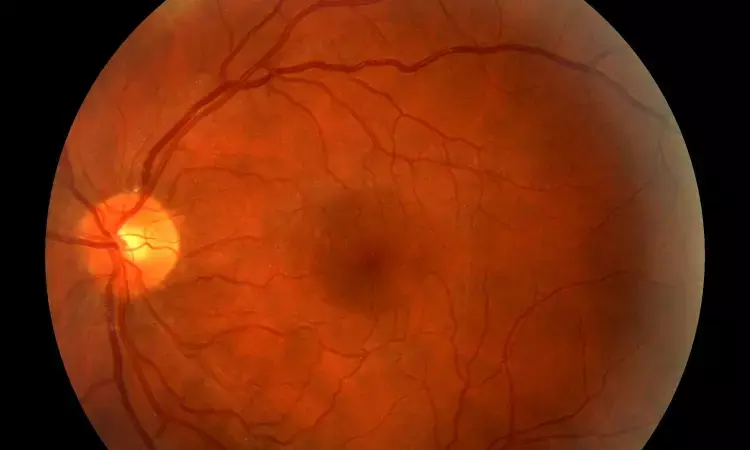- Home
- Medical news & Guidelines
- Anesthesiology
- Cardiology and CTVS
- Critical Care
- Dentistry
- Dermatology
- Diabetes and Endocrinology
- ENT
- Gastroenterology
- Medicine
- Nephrology
- Neurology
- Obstretics-Gynaecology
- Oncology
- Ophthalmology
- Orthopaedics
- Pediatrics-Neonatology
- Psychiatry
- Pulmonology
- Radiology
- Surgery
- Urology
- Laboratory Medicine
- Diet
- Nursing
- Paramedical
- Physiotherapy
- Health news
- Fact Check
- Bone Health Fact Check
- Brain Health Fact Check
- Cancer Related Fact Check
- Child Care Fact Check
- Dental and oral health fact check
- Diabetes and metabolic health fact check
- Diet and Nutrition Fact Check
- Eye and ENT Care Fact Check
- Fitness fact check
- Gut health fact check
- Heart health fact check
- Kidney health fact check
- Medical education fact check
- Men's health fact check
- Respiratory fact check
- Skin and hair care fact check
- Vaccine and Immunization fact check
- Women's health fact check
- AYUSH
- State News
- Andaman and Nicobar Islands
- Andhra Pradesh
- Arunachal Pradesh
- Assam
- Bihar
- Chandigarh
- Chattisgarh
- Dadra and Nagar Haveli
- Daman and Diu
- Delhi
- Goa
- Gujarat
- Haryana
- Himachal Pradesh
- Jammu & Kashmir
- Jharkhand
- Karnataka
- Kerala
- Ladakh
- Lakshadweep
- Madhya Pradesh
- Maharashtra
- Manipur
- Meghalaya
- Mizoram
- Nagaland
- Odisha
- Puducherry
- Punjab
- Rajasthan
- Sikkim
- Tamil Nadu
- Telangana
- Tripura
- Uttar Pradesh
- Uttrakhand
- West Bengal
- Medical Education
- Industry
Strict Glucose Control Without Hypoglycemia Prevents Retinopathy: JAMA

A new study published in JAMA Ophthalmology has found that keeping blood glucose tightly controlled without inducing hypoglycemia can prevent the onset of diabetic retinopathy in people with type 2 diabetes substantially. The results emerge from a secondary analysis of the Japan Diabetes Optimal Integrated Treatment Study for 3 Major Risk Factors of Cardiovascular Diseases (J-DOIT3), a large, long-duration randomized clinical trial. The research stresses that both elevated blood glucose levels and frequent hypoglycemia contribute to retinopathy risk independently, even in patients with good glycemic control. The study was conducted by Takayoshi S. and colleagues.
The J-DOIT3 trial was a multicenter, open-label, randomized clinical trial performed in 81 Japanese sites from June 2006 through March 2009, with follow-up to August 2025. There were 2540 participants (5080 eyes) aged 45 to 69 years with type 2 diabetes and comorbid hypertension and/or dyslipidemia. Participants were assigned at random to receive intensive multifactorial therapy, targeting glucose, blood pressure, and lipid levels, or conventional therapy. The median follow-up was 8.5 years. The secondary analysis in the current report systematically compared diabetic retinopathy outcomes, specifically onset, progression, and vision loss due to retinopathy.
Results
• Participants' mean (SD) age was 59.0 (6.3) years, and 965 participants (38.0%) were women.
• Intensive therapy significantly lowered the risk of new-onset retinopathy compared with conventional therapy (hazard ratio [HR], 0.83; 95% CI, 0.70–0.98; P = 0.03).
• It did not independently impact retinopathy progression (HR, 1.02; 95% CI, 0.70–1.49; P = 0.93).
• Hemoglobin A1c (HbA1c) levels at one year after randomization were significantly associated with the development of retinopathy (HR, 1.31; 95% CI, 1.13–1.51; P < 0.001), even after controlling for baseline risk factors of body mass index, duration of diabetes, fasting glucose, blood pressure, and nephropathy.
• No defined HbA1c threshold was found to recommend any level of glucose exposure as causing retinal damage.
This Japanese clinical trial of large scale proved intensive multifactorial treatment to reduce the risk of diabetic retinopathy in patients with type 2 diabetes, only if hypoglycemia is avoided. Increased HbA1c and recurrent episodes of hypoglycaemia were independently associated with increased risk of retinopathy, again proving that perfect glucose control without hypoglycaemia is the cornerstone of maintaining vision and long-term quality of life while treating diabetes.
Reference:
Sasako T, Ueki K, Miyoshi K, et al. Effect of a Multifactorial Intervention on Retinopathy in People With Type 2 Diabetes: A Secondary Analysis of the J-DOIT3 Randomized Clinical Trial. JAMA Ophthalmol. Published online October 23, 2025. doi:10.1001/jamaophthalmol.2025.3819
Dr Riya Dave has completed dentistry from Gujarat University in 2022. She is a dentist and accomplished medical and scientific writer known for her commitment to bridging the gap between clinical expertise and accessible healthcare information. She has been actively involved in writing blogs related to health and wellness.
Dr Kamal Kant Kohli-MBBS, DTCD- a chest specialist with more than 30 years of practice and a flair for writing clinical articles, Dr Kamal Kant Kohli joined Medical Dialogues as a Chief Editor of Medical News. Besides writing articles, as an editor, he proofreads and verifies all the medical content published on Medical Dialogues including those coming from journals, studies,medical conferences,guidelines etc. Email: drkohli@medicaldialogues.in. Contact no. 011-43720751


